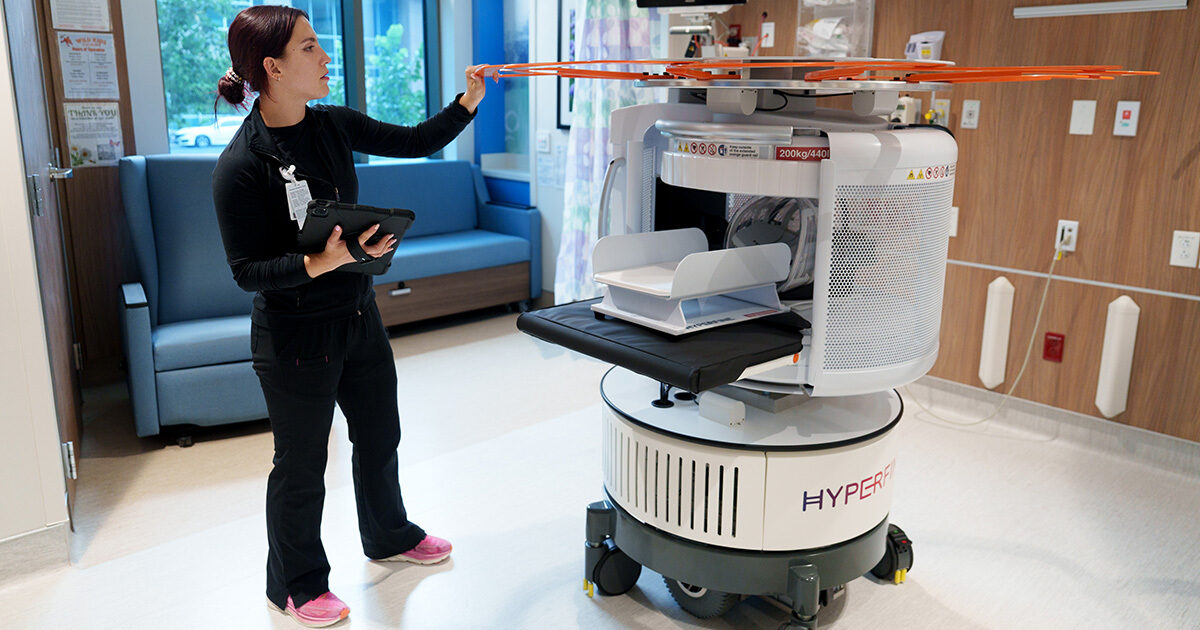Advanced Imaging on Demand: How a Portable MRI is Improving Outcomes for High-Risk Patients
Newly adopted Swoop Hyperfine MRI is helping UT Health Austin deliver faster, safer care for critically ill children
Reviewed by: Chelsey Ortman, MD; Michael Cronin, MD, MPH
Written by: Lily Vining

When every second counts, a powerful new imaging tool is helping UT Health Austin clinicians respond faster. Now available through UT Health Austin Pediatric Neurosciences at Dell Children’s, the Hyperfine Swoop portable MRI brings advanced brain imaging directly to a child’s bedside — eliminating the need for transport and reducing risk for critically ill patients.
Earlier this year, Dell Children’s Medical Center became the first pediatric hospital in Texas to adopt the device, offering families in Central Texas access to cutting-edge technology previously limited to select centers nationwide. By delivering rapid, point-of-care brain scans in moments of crisis, the new MRI system supports safer, more immediate decision-making for children in fragile or unstable condition.
Faster, Safer Scans for the Sickest Kids
For children in fragile or unstable conditions, rapid, high-quality imaging can make a life-saving difference. In conventional practice, children on ventilators, extracorporeal membrane oxygenation, or other life-support systems must be carefully transported to the radiology suite for MRI scans. This process can be logistically complex, time-consuming, and sometimes unsafe. For faster results, clinicians often rely on fast CT scans instead, which provide less detail.
“It was challenging, if not nearly impossible, to obtain diagnostic imaging for our highest acuity patients,” says Chelsey Ortman, MD, pediatric epileptologist with UT Health Austin Pediatric Neurosciences at Dell Children’s. “Now, with the Swoop at the bedside, we can obtain imaging early, even when a child’s vital signs are unstable. It lets us catch strokes, meningitis, or abscesses sooner and adjust treatment in real time.”
Michael Cronin, MD, MPH, pediatric critical care physician and medical director of the pediatric intensive care unit at Dell Children’s North, agrees.
“We’ve been able to obtain actionable imaging for patients we simply couldn’t transport safely before,” he says. “It’s already made a difference in cases of acute stroke, post-cardiac arrest monitoring, and brain hemorrhages. Having this tool in the room changes how we can intervene and make life-saving decisions.”
More Comfort, Less Stress for Families
Beyond clinical benefits, the portable MRI also improves the experience for patients and their families. Its open design allows caregivers to remain at the bedside, providing comfort and reassurance during scans.
“Families get peace of mind knowing they can stay with their child, and our team can focus on care without worrying about transporting fragile patients,” says Dr. Ortman.
A Step Ahead in Pediatric Innovation
Dell Children’s is among the first pediatric hospitals in the U.S., and the first in Texas, to integrate the Hyperfine Swoop system into neurocritical care.
“We’re in the top tier of hospitals using this technology,” says Dr. Ortman. “It’s at the cutting edge of what’s possible in diagnostics in the ICU, allowing our clinicians to make faster, more informed decisions while minimizing risk for the patient.”
This advancement also reflects UT Health Austin’s broader commitment to digitally enabled, integrated care. As part of a leading academic medical center, UT Health Austin brings the expertise and infrastructure needed to translate innovations like the Swoop into meaningful improvements in patient outcomes.
Expanding Access to Smarter Imaging
Though still new to Dell Children’s, the technology is already reshaping care. The team is exploring ways to expand its use to other units, such as the neonatal intensive care unit, where even small movements can pose major risks for premature or medically fragile babies.
For Dr. Ortman, the value of portable MRI isn’t just in what it shows, but in what it prevents.
“If my child were critically ill, this would give me the greatest peace of mind — knowing that Dell Children’s has the technology to provide the best possible care without unnecessary risks or delays,” she says.
With the Hyperfine Swoop at the bedside, Dell Children’s and UT Health Austin are redefining what’s possible for critically ill children, allowing clinicians to act faster, families to stay close, and outcomes to improve—all without compromising safety or quality.
Learn more about UT Health Austin Pediatric Neurosciences at Dell Children’s.